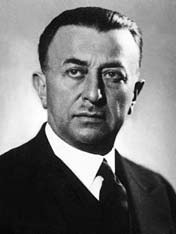Şükrü Kaya
| Şükrü Kaya | |
|---|---|
 |
|
| Minister of Interior | |
|
In office October 25, 1937 – November 11, 1938 |
|
| Prime Minister | Celal Bayar |
| Succeeded by | Refik Saydam |
| Minister of Interior | |
|
In office November 1, 1927 – October 25, 1937 |
|
| Prime Minister | İsmet İnönü |
| Preceded by | Mehmet Cemil Uybadın |
| Minister of Foreign Affairs | |
|
In office November 21, 1924 – March 3, 1925 |
|
| Prime Minister | Ali Fethi Okyar |
| Preceded by | İsmet İnönü |
| Succeeded by | Tevfik Rüştü Aras |
| Minister of Agriculture | |
|
In office August 31, 1924 – October 21, 1924 |
|
| Prime Minister | Ismet Inönü |
| Preceded by | Zekai Apaydın |
| Succeeded by | Hasan Fehmi (Ataç) |
| Mayor and Governor of Izmir | |
|
In office 1922–1924 |
|
| Personal details | |
| Born | 1883 Istanköy, Ottoman Empire |
| Died | January 10, 1959 Istanbul, Turkey |
| Nationality | Turkish |
| Alma mater | Galatasaray High School, University of Paris |
| Profession | Jurist |
| Signature |  |
Şükrü Kaya (1883 – January 10, 1959) was a Turkish civil servant and politician, who served as government minister, Minister of Interior and Minister of Foreign affairs in several governments.
Born in İstanköy (Kos), part of the Dodecanese in the then Ottoman Empire, he finished Galatasaray High School before he graduated from Law School in 1908. He did his graduate work in Paris, France. He worked as inspector of treasury for the Empire.
At the start of World War I, Şükrü was appointed the Director of the Settlement of Tribes and Migrants. The Director of the Settlement of Tribes and Migrants was mainly tasked with managing the Armenian deportations during the Armenian Genocide. In September 1915, he was transferred to Aleppo, an important location along the deportation route into the Syrian desert.
As the Armenian Genocide was underway, Şükrü was tasked to administrate the concentration camps of Armenian deportees located in Syria. In order to manage the large influx of Armenians into the area, Şükrü started a policy that enforced a certain ratio of Armenians to be left untouched. However, once the Armenians exceeded this ratio, they were evacuated from their camps and subsequently massacred. On 19 December 1915, Şükrü is noted to have said to German engineer Bastendorff the following:
The final solution is the termination of the Armenian race. Clashes that have continued between Armenians and Muslims all along have now reached their final stage. The weaker side will be destroyed.
He was then assigned to Iraq but he resigned and moved to İzmir (also known as Smyrna).
He worked as a teacher in Buca Sultanisi (high school). After the Armistice of Mudros, he worked for the Turkish national movement. Following the occupation of Istanbul by The Entente powers, he was arrested by the British administration and was exiled to Malta. He escaped to the continent from Malta and subsequently went to Anatolia and joined the Turkish War of Independence.
...
Wikipedia
